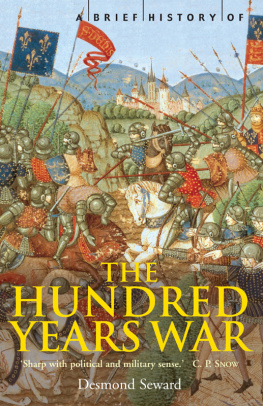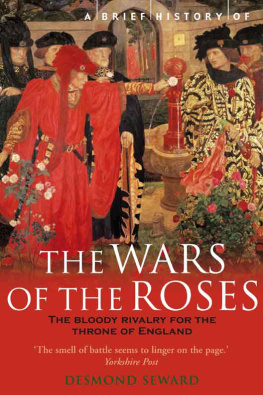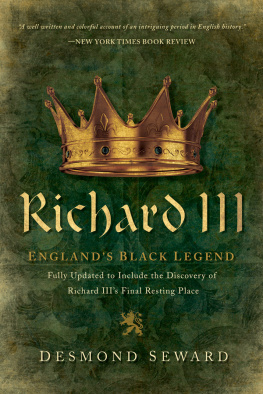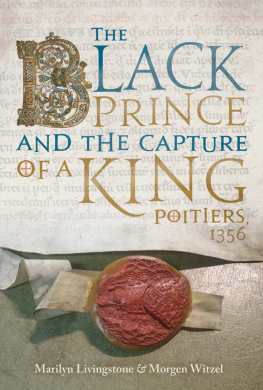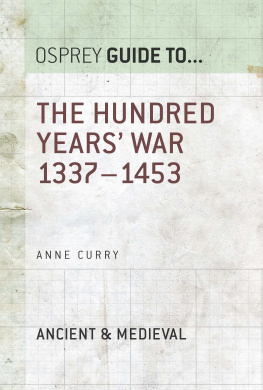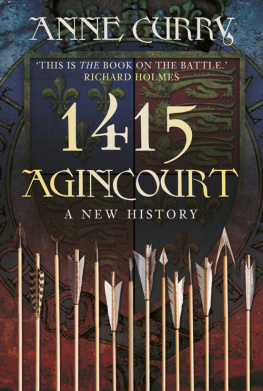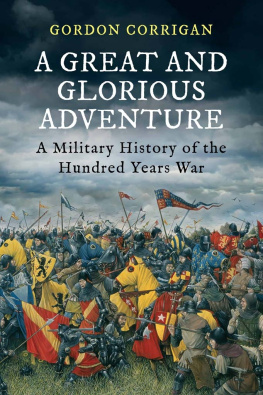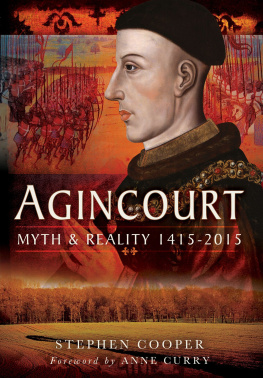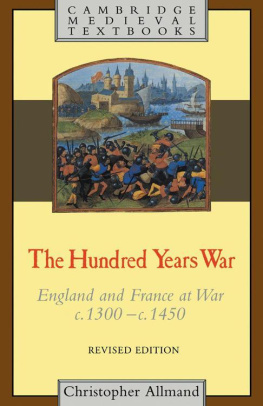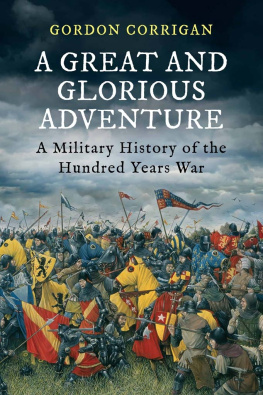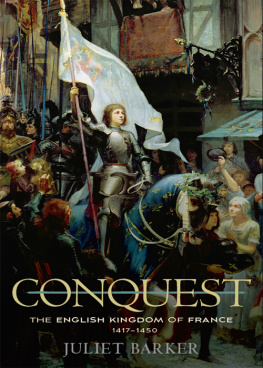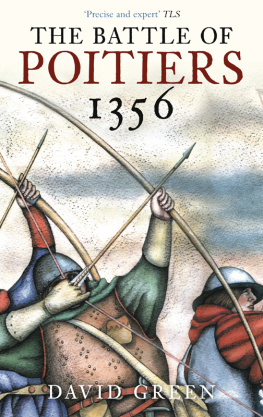DESMOND SEWARD was born in Paris and educated at Ampleforth and Cambridge. He has written numerous history books including Napoleon and Hitler, The Wars of the Roses, Richard III: Englands Black Legend and The Monks of Warthe first general history of the military religious orders, from their foundation until the present day, to appear since the eighteenth century.
Praise for The Hundred Years War
Born in France, educated in England, and blessed with a talent for presenting historical facts in an accessible narrative, Seward seems an ideal author for recounting this very complex period. He has mixed intimate detail with major political and military events to achieve a book that is both accurate and concise without becoming pedantic or overtly nationalistic.
The Antioch Review
A lively account of The Hundred Years War... Gracefully written, amply illustrated, well endowed with battle charts, genealogical tables, and maps, the book should find an appreciative audience among the general public.
Choice
With a propulsive narrative thrust Desmond Seward unfolds the events of this seminal period in the development of both English and French nationalism in a way that will delight the general reader and not offend the scholarly specialist.
Sunday Advocate (Baton Rouge, La.)
Desmond Seward has written a brief, comprehensive narrative which focuses on the reality of the war without losing sight of its romantic by-products... The Hundred Years War is a well-written history that speaks directly to many of the crises of the twentieth century. Seward has the skill to make these parallels apparent and the restraint not to labor them.
St. Louis Globe-Democrat
Other titles in this series
A Brief History of The Tudor Age
Jasper Ridley
A Brief History of The Druids
Peter Berresford Ellis
A Brief History of The Boxer Rebellion
Diana Preston
A Brief History of Fighting Ships
David Davies
A Brief History of The Royal Flying Corps in World War I
Ralph Barker
A Brief History of Science
Thomas Crump
A Brief History of British Kings & Queens
Mike Ashley
Forthcoming
A Brief History of The Circumnavigators
Derek Wilson
A Brief History of Christianity
Bamber Gascoigne
A BRIEF HISTORY OF
THE HUNDRED YEARS WAR
THE ENGLISH IN FRANCE, 1337-1453
DESMOND SEWARD
ROBINSON
London
Constable & Robinson Ltd
5556 Russell Square
London WC1B 4HP
www.constablerobinson.com
First published in the UK as The Hundred Years War
by Constable and Company Ltd, 1978
This revised edition published by Robinson,
an imprint of Constable & Robinson Ltd, 2003
Copyright Desmond Seward 1978, 2003
The right of Desmond Seward to be identified as the author of this work has been asserted by him in accordance with the Copyright, Designs and Patents Act 1988
All rights reserved. This book is sold subject to the condition that it shall not, by way of trade or otherwise, be lent, re-sold, hired out or otherwise circulated in any form of binding or cover other than that in which it is published and without a similar condition including this condition being imposed on the subsequent purchaser.
A copy of the British Library Cataloguing in
Publication data is available from the British Library
ISBN 978-1-84119-678-7
eISBN 978-1-4721-1220-0
Printed and bound in the EU
Cover design: Simon Levy;
Cover painting: Battle of Agincourt, English School, 19th Century, The Stapleton Collection, Bridgeman Art Library
For Pierre & Yolande de Montalembert
Contents
6 Burgundy and Armagnac:
Englands Opportunity 13991413
Illustrations
Genealogical tables
Diagrams and Maps
Acknowledgements
My first debt is to two Benedictine monks, Dom Marcel Pierrot and Dom Jean Bequet of Ligug, who took me over the battlefield of Poitiers, many years ago. I am sincerely grateful to them for starting my interest in the Hundred Years War, and to their monastery for its memorable hospitality.
I am especially indebted to Sir Reresby Sitwell for much encouragement, for many useful ideas, and for reading the typescript and the proofs; to the late Sir Iain Moncreiffe of that Ilk for the suggestion that Charles VIs madness may have been caused by porphyria; and to Commander W. F. Patterson, RN (Retd), Chairman of the Society of Archer-Antiquaries, for the diagrams of the long-bow and crossbow and for advice on the technical points of medieval bowmanship.
Among those who gave me information about the part played by their families in the Hundred Years War were Lord Mowbray, Segrave and Stourton, Lord Dunboyne and the Hon Nicholas Assheton. Lord Mowbray supplied me with material about the life of his ancestor the first Lord Stourton, who had an unusually profitable career during the later stages of the War, Lord Dunboyne provided me with details about the Butlers and other Irishmen in France, while Mr Assheton drew my attention to Sir John Assheton who served with Henry V in Normandy.

Do you not know that I live by war and that peace would be my undoing?
Sir John Hawkwood
This is a short, narrative account of the Hundred Years War for the general reader. Other studies have either been translated from the French, and dismiss Agincourt in a few lines, or are too scholarly. However, while this book is not for the specialist, it makes full use of research which has radically altered the traditional picture of the War.
The phrase The Hundred Years War only gained currency during the late nineteenth century. In fact it gathers together a series of wars which lasted longer than a hundred years. They began in 1337 when Philip VI of France confiscated the English-held Duchy of Guyenne from Edward III, who then claimed the French throne, and ended in 1453 when the English finally lost Bordeaux. For most of the period England enjoyed a remarkable military superiority thanks to the fire-power of the long-bow.
Some battles are part of the English legend, like the victories of Crcy, Poitiers and Agincourt, but there are also the little known (to Englishmen) defeats at the end when French guns routed their once invincible archers. The protagonists are among the most colourful in English and French history: Edward III, the Black Prince, and the even more formidable Henry V; the splendid but inept John II who died a prisoner in London, the sickly, limping intellectual Charles V, who very nearly overcame the English, and the enigmatic Charles VII (Joan of Arcs Dauphin) who at last drove them out. The supporting English cast included such men as Sir John Chandos, John of Gaunt, the Duke of Bedford and Old Talbot, as well as Sir John Fastolfthe original of Shakespeares Falstaff. On the French side were figures like the Constable du Guesclin, the Bastard of Orleans and the witch-saint from Domrmy.
For over a century one Western country systematically plundered another. A distinguished historian has written that the English attitude to the War was as a speculative, but at best hugely profitable, trade that was shared by all who joined the mercenary armies of Edward III and Henry V... He adds that by 1450 among those who had done best out of the war were the great landed families, while as for needy adventurers of obscure birth and no inherited property; scores of them made notable fortunes. Indeed, generations of Englishmen of every class went to France to seek their fortunes in rather the same way that their descendants would one day go to India or Africa.
Next page
